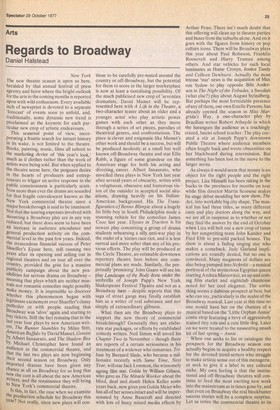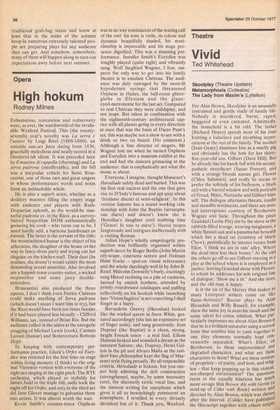Arts
Regards to Broadway
Daniel Halstead
New York The new theatre season is upon us here, heralded by that annual festival of press agentry and furor where the bright outlook for the arts in the coming months is reported Upon with wild enthusiasm. Every available inch of newsprint is devoted to a separate 'forecast' of events soon to unfold, and, traditionally, some dynamic new trend is Proclaimed as the keynote for each particular new crop of artistic endeavours.
This seasonal point of view, incorporating a frantic search for instant history in its wake, is not limited to the theatre. Books, painting, music, films all submit to the marketing device of 'this year's look,' much as if clothes rather than the work of artists were being sold. But when applied to the theatre scene here, the poignant desire in the hearts of producers and entrepreneurs to trigger an active response in the Public consciousness is particularly acute. Now more than ever the drums are sounded for that fragile convalescent known as the New York commercial. theatre since a major breakthrough is said to be imminent. Not that the soaring expenses involved with mounting a Broadway play are in any way reduced, but there does seem to have been an increase in audience attendance and general production activity on the commercial level in the past few years. Indeed, the tremendous financial success of Peter Shaeffer's Equus here, still running two Years after its opening and selling out in regional theatres and on tour all over the Country, provided the grist for a massive Publicity campaign about the new possibilities for serious drama on Broadway — meaning that plays which are neither musicals nor romantic comedies might possibly make money. It is impossible to discover whether this phenomenon began with legitimate excitement over Shaeffer's classy Potboiler or with people reading that Broadway was 'alive' again and starting to buy tickets. Still the fact remains that in the last year four plays by new American writers, The Runner Stumbles by Milan Stitt, American Buffalo by David Mamet, Gemini bY Albert Innaurato, and The Shadow Box by Michael Christopher have found an audience in the commercial theatre, and that the last two plays are now beginning their second season on Broadway. Only imported dramas have been given any chance at all on Broadway for so long that now the cant is all about the new American writers, and the renaissance they will bring to New York's commercial theatre.
Is this, in fact, the case when we examine the production schedule for Broadway this Year? Not really, since new plays will con tinue to be carefully pre-tested around the country or off-Broadway, but the potential for them to score in the larger marketplace is now at least a tantalising possibility. Of the much publicised new crop of 'seventies dramatists, David Mamet will be represented here with A Life in the Theatre, a two-character teaser about an older and a younger actor who play artistic power games with each other as they move through a series of set pieces, parodies of theatrical genres, and confrontations. The piece is clever and enigmatic like Mamet's other work and should be a success, but will be produced modestly at a small but well known off-Broadway theatre and star Ellis Rabb, a figure of some grandeur on the American stage for both his acting and directing. career. Albert Innaurato, who unveiled three plays in New York last year after several years of obscurity, writes with a voluptuous, obsessive and humorous vision of the outsider in accepted social situations, drawing heavily on his ItalianAmerican background. His The Transfiguration of Benno Bum pie about a hugely fat little boy in South Philadelphia made a stunning vehicle for the comedian James, Coco last year. Ulysses in Traction is his newest play concerning a group of drama students rehearsing a silly anti-war play in the midst of a 'sixties race riot, and it is less surreal and more sober than any of his previous efforts. The play will be produced at the Circle Theatre, an estimable downtown repertory theatre here before any commercial plans are made. Similarly, the perpetually 'promising' John Guare will see his play Landscape of the Body done under the umbrella of Joseph Papp's New York Shakespeare Festival Theatre and not as a Broadway item — despite reports that this saga of street gangs may finally establish him as a writer of real substance and not simply of extraordinary glibness.
What then are the Broadway plays to support the new theory of commercial breakthrough? Generally they are elaborate star packages, or efforts by established comedy writers. Neil Simon will unveil his Chapter Two in November — though there are reports of a certain seriousness in his treatment of a widower wild remarries. Tribute by Bernard Slade, who became a millionaire recently with Same Time, Next Year, will star Jack Lemmon, the winsomely ageing film star. Golda by William Gibson, who gave us The Miracle Worker about the blind, deaf and , dumb Helen Keller some years back, now gives you Golda Meier who has all of her senses intact and will be impersonated by Anne Bancroft and directed with lots of fancy mixed media effects by Arthur Penn. There isn't much doubt that this offering will clean up in theatre parties and buses from the suburbs alone. And on it goes with the figures from history or pop culture icons. There will be Broadway plays this year about Paul Robeson, Franklin Roosevelt and Harry Truman among others. And star vehicles for such local luminaries as Hume Cronyn, Jessica Tandy and Colleen Dewhurst. Actually the most intense 'star' news is the acquisition of Max von Sydow to • play opposite Bibi Anderson in The Night of the Tribades, a Swedish (what else?) play about August Strindberg. But perhaps the most formidable presence ofany of them, our own Estelle Parsons, has already opened the season in Miss Margrida's Way, a one-character play by Brazilian writer Robert Athayde in which she harangues the audience as a touchingly crazed, fascist school teacher. The play created a stir at Joseph Papp's downtown Public Theatre where audience members often fought back and wrote obscenities on her blackboard during intermission. But something has been lost in the move to the larger arena.
As always it would seem that money is no object for the right people and the right project. Liza Minnelli has been raking in the bucks in the provinces for months on tour while film director Martin Scorsese makes his stage debut moulding her new show, The Act, into workable big city shape. The musical has had three titles, as many different casts and play doctors along the way, and we are all in suspense as to whether or not they find the answer by the end of October when Liza will belt out a new crop of tunes by her songwriting team John Kander and Fred Ebb to pre-sold packed houses. The show is about a fading singing star who makes a comeback. Judy Garland implications are roundly denied, but no one is convinced. Many megatons of dollars are also being pumped into Nefertiti — a musical portrayal of the mysterious Egyptian queen starring Andrea Marcovicci, an up and coining film starlet and nightclub chanteuse noted for her cool elegance. The entire thing seems a dubious prospect at best, but who can say, particularly in the realm of the Broadway musical. Last year at this time no one would have bet on the chances of a musical based on the 'Little Orphan Annie' comic strip featuring a bevy of aggressively trained tiny tots and a cute little dog. Later on we were treated to the nauseating smash hit of last spring Annie.
' When one seeks to list or catalogue the prospects for the Broadway season one actually begins to acquire a healthy respect for the devoted trend-setters who struggle to make artistic sense out of this menagerie, or seek to give it a label in any cultural niche. My own feeling is that the institutional and off-Broadway theatres will con tinue to feed the most exciting new work into the mainstream as in times gone by, and that even on Broadway the real blockbuster success stories will be a complete surprise. Let us retire the commercial theatre to its traditional grab-bag status and know at least that in the midst of the autumn hoop-la numerous extremely talented people are preparing plays for any audience they can get. And somehow, somewhere, many of them will happen along to turn our expectations awry before next summer.



































 Previous page
Previous page